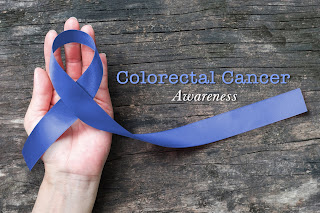Colorectal
cancer is the second leading cause of cancer death but is highly preventable
when caught early. How can you catch it early? Have a colonoscopy. A colonoscopy
is an exam used to find abnormalities and changes in the rectum and large
intestine. It is a safe and simple procedure where a long, thin, flexible and
lighted tube with a camera allows the doctor to view the inside of the colon.
If polyps or other types of abnormal tissue are found, they can be removed at
that time. Biopsies can also be taken during the exam.
Screening
for colon cancer should start at age 50 if you are at average risk and with no
other risk factors other than your age. There are other screening options
besides a colonoscopy, but having one is the screening gold standard as it
scans the entire colon.
What are
some risk factors for colon cancer?
· Personal medical history (inflammatory bowel disease, Crohn’s disease, ovarian/breast/endometrial cancers, previous colon cancer or polyps, and people of African American or Hispanic descent) · Physical inactivity
· Being overweight or obese
· Hereditary risks (increased risk with a close relative who has had it)
· A diet high in red and/or processed meats, low fruit/vegetable intake
· Smoking
· Alcohol intake above moderation
How can you reduce your risk?
· Get recommended screenings
· Eat fruits and vegetables every day
· Aim for whole grains in bread, cereals, nuts and beans
· Limit red and processed meats
· Be physically active and aim for 30 minutes of activity 5-7 times a week
· Lose weight if you need to
· Stop smoking
· Limit your alcohol consumption
Why is it
done?
· Investigate certain signs and symptoms you may be having such as abdominal pain, bleeding, chronic constipation or diarrhea · If you’ve had polyps found on a previous colonoscopy, a follow-up one will look for and remove additional polyps
Information
on how to do the prep will be given to you from your physician. It is done the
day before the procedure to clean out the colon. There are tips that can help
manage your time prepping for the procedure.
Sedation is
given during the colonoscopy, so you don’t have discomfort. You’ll be able to
discuss anesthesia options with the anesthesiologist and nurse anesthetist
prior to the procedure.
Be sure to
check with your insurance company if you have a co-pay or deductible or other
cost sharing for the procedure. You might also want to check if they offer any
incentives for having a screening.
For this
March Colorectal Awareness month, don’t put off a colonoscopy any longer. Talk
to your doctor for your options and get it scheduled pronto.


No comments:
Post a Comment